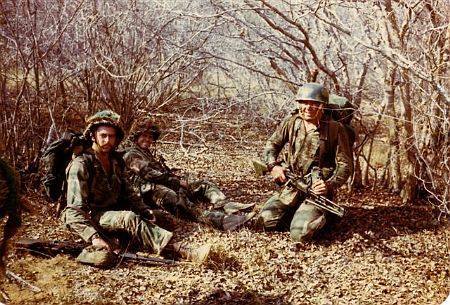
Wherever you are and what kind of lifestyle you would not have led - hygiene is one of the most important components of human life on earth! It is the guarantee of health, physical and human aesthetic state!
Footwear. Healthy legs - the basis of survival. In order not to rub his feet, it is necessary to follow the shoes, especially in damp climates and winter.
Boots or other leather shoes daily to grease (so long served). Shoe cream can be replaced with unsalted bacon, fat waterfowl (fish), vegetable oil. It is best to tar. For this we need to find a birch. Lower into a tin can and a piece of birch bark is heated in the fire. Will start to appear dark liquid - this is tar. lubricate shoes, cleansed of dirt, be sure to dry and preferably slightly heated in the sun or by the fire.
Shoes have to be dried carefully, since rapid drying (close to Kostru) it may deteriorate, as in the case, when wet shoes left in the cold.
drying methods. Filling the shoes heated pebbles, sand, paper, dry hay, moss, sawdust or ears of wild grasses - this contributes to drying and prevents deformation.
In an extreme case it is possible to put on damp boots (boots) Dry socks and foot wraps. It is better to wear shoes larger image, to be able to put at least two socks. Warm double toe can do, if you put between a pair of socks dry grass, moss, plastic bag or feathers.
clothing. It must be clean, dry, enough free, comfortable. It is necessary to shake out clothing on a daily basis, airing it, dried in the sun or by the fire (protected from burning).
Whenever possible, swim in natural bodies of water with clean water, or arrange for hot water bathing, and washing clothes. About the bath I will not write - a separate issue!
Avoid clothes humidification. Most often the reason - heavy sweating. It is necessary to remove excess clothing, leaving windbreaker, shtormovku.
Socks. Wool or cotton socks. Wool socks absorb sweat better. It is necessary to regularly take off one's shoes, timely change socks. If there is no replacement, often they wash. To laundered socks were drying faster, put them under clothing on the body. If a fire is burning - dry around him (just do not burn and do not drop in cereal). Winter socks can be frozen, then knock them out - to remove dirt, sweat, salts and moisture.
Daily skin care and toes. Toenails should be trimmed, so as not to interfere with walking! 😉
If the heat - after a long, exhausting walk lower legs for a few minutes in cold water.
One means of preventing fungal diseases - every day rubbing the skin folds between the toes with a disinfectant solution: 0,5% potassium permanganate (potassium permanganate), 2-3% formalin; soap paste, boric acid. If anything like that - to pour the folds of skin mashed in the dust-dry tinder fungus, fireweed fluff (willow-herb), sphagnum moss. Sphagnum moss is widespread in the swamps, it has a red or yellow hue. his tear, cleaned of rough bottom of the stem, squeeze hands and dried in air. then ground, to do as gently as possible and gentler. This moss absorbs moisture and contains substances, killing microflora festering wounds, scratch, cuts.
scrapes. It can start the inflammatory process. Put on the bubble pad, to reduce pressure and friction. If it is impossible to put on shoes, gently pierce the bubble with a sterile needle (sterilized with alcohol, can be ignited in the fire), grease iodine, Stick leykoplastыr. Well reduces inflammation mashed plantain leaf (clean).
Bleeding rubbing process boric acid, potassium permanganate, triple cologne (add a little boiling water). Fit and ointment of calendula. Nettle is a styptic (chop, pribintovatʹ).
Gastrointestinal disease. The most common diseases are diarrhea, food poisoning and other gastrointestinal disorders.
must: not to drink unboiled water. Prior to use water to dissolve therein decontamination tablet or boil. If you can not boil water, throw it into crystals of potassium, PANTOCID, tablets or powder activated carbon. Obezzarazhyvayut water elderberry, willow bark, lilac leaves, çeryomuhi.
Do not eat with your hands. Keep food and water from flies and other insects. Include forestry residence clean.
Teeth. In the absence of a toothpaste can be cleaned with powdered charcoal (basswood), admixed thereto dried and shredded peppermint leaf. You can use the water table salt.
Toothbrush - sprigs of spruce, or pine sprigs of fresh limes or aspen. On the one hand sprig cleaved into small pieces, chew. It clean and. You can brush your teeth with your finger, at the same time massaging the gums. After eating, rinse your mouth, if there is drinking water.
Soap. If it is not - it is possible to find substitutes in nature.
Dog soap or saponaria - low (30-50 cm) plant of the family Caryophyllaceae, oblong leaves and white flowers, collected at the top of the stem in bunches of five - seven pieces
If the root of soapwort, dried and crushed, mix with water, will froth (toksichnaya, Not to be taken internally).
Polypore mushroom (inside), It grows on the trunks of larch.
elderberry. Do not give a foam, but well-washed mud.
Clay - wash, and you can wash (enough water necessary for rinsing).
ash lye: white ashes from burnt wood was soaked in water. Alkali passes from ashes in water. The water used for washing (so our ancestors erased).
Usually on the march and in a temporary shelter no opportunity to wash with hot soapy water, washing laundry, hair cutting and shaving. Nevertheless, compliance with certain rules of hygiene is strictly necessary.
At first, leaving the raid (campaign) must be short haircut, shave off his mustache (if they were), cut as short as possible nails on the fingers and toes. We must always take care, to underwear and socks (footcloths) remain clean and dry. Least, needed daily during halts (overnight) shake out clothes, footwear and underwear, ventilate and dry them. Hand wash at least a cold water or wipe them disinfectants (alcohol, gasoline, manganese, aftershave cream, etc.. d.). If the weather permits, and environmental conditions, required to swim in natural bodies of water with clean water or organize extremities hot water wash, and washing clothes.
Secondly, should be avoided chafing feet. leg abrasions usually occur from improperly fitted shoes, from the long circulation in a wet shoes, from the inability to wind puttee, on, that toenails are too big and dirty.
must, the shoe was always dry, raznošennoj, without folds and irregularities within. Heading into training raid, and even more so on a combat mission, better shoe good shoes, than boots. Good, which means strong, with sturdy lacing (no "sticky"!) and high. Each scout must have at least two pairs of sneakers in their personal property (You do not have to wait for their acquisition by the command of the military unit).
Daily skin care and toes is strictly necessary.
With bad legs intelligence is not intelligence, and a burden for the other members of the group. In war, because of this "invalid" can be simply killed all. One means of preventing fungal diseases - every day rubbing the skin folds between the toes with a disinfectant solution: 0, 5% potassium permanganate (potassium permanganate), 2-3% formalin; soap paste, boric acid. You can also pour the folds of skin mashed in the dust-dry tinder fungus, fireweed fluff (willow-herb), sphagnum moss.
Sphagnum moss is widespread in the swamps, it has a red or yellow hue. his tear, cleaned of rough bottom of the stem, squeeze hands and dried in air. then ground, to do as gently as possible and gentler. This moss absorbs moisture and contains substances, killing microflora festering wounds, scratch, cuts.
If the legs still were erased, must pierce the skin disinfected with bubbles needle fluid, squeeze out the liquid with clean hands and without breaking the skin to lubricate the affected places Vishnevsky ointment or salve sintomitsinovoy. Then lay on top of the pad, swab and bandage (either seal the plaster). Bleeding rubbing treated with boric acid or potassium permanganate, at worst triple cologne (slightly diluted with boiled water) and sprinkled streptotsidom. Speaking of pads. It is desirable to have in your first-aid kit a few feminine hygiene packages, available on the market today everywhere. Many examples of such packages are very convenient for use in the field as bandages and tampons. Especially when abrasions feet, shoulders or around the crotch area.
Thirdly, do not forget about the shoulders. Scout has to bear the dozens of kilograms of cargo: weapon, ammunition, explosives, food, devices (eg, radio or video camera), equipment.
Therefore, we should as much as possible carefully customized to the body belts, buckle, backpack, pouches, and everything else. It is expedient to "amplify" uniform in the shoulders and neck special pads on top and inside pads (can be hemming women's above-mentioned gasket). At every halt a large check the status of their shoulders. Preventive measures against them the same, and that the leg.
Care of clothing and footwear shoe should always be carefully monitored, especially when operating in wet climates and winter. Shoes need to increasingly dry, being careful, since rapid drying (fire with fire, at a hot stove) it may deteriorate, as well as when leaving the cold wet shoes. A good way of drying is heated filling shoe (So, that did not burn) pebbles, sand, small stones. Footwear can fill the paper, dry hay or moss - this contributes to drying and prevents deformation. Permissible in extreme cases putting wet boots (boot) Dry socks and foot wraps, but not vice versa.
Regularly lubricate the shoes with a thin layer of shoe polish. Shoe cream can be replaced with unsalted bacon, tar, fat waterfowl (fish), raw soap, vegetable oil. For tar need to heat the bark in the pot on the fire until, until dark liquid was distilled.
When carrying loads correctly fill a backpack (satchel): small items need to be laid to the back, solid and heavy - in the lower half of the backpack. Backpack straps customize for growth so, to its lower edge (fixed load) adjoined to the sacrum. Fitted thus a satchel does not beat on the back and pulls the shoulders are not too. At heavy load (more 20 kg) you need to take care of the pad under the shoulder straps (foam, felt, moss, etc.. d.).
In winter, you need to carefully monitor the serviceability of clothes, keep it dry and protected from the burning. The most common cause wetting of clothes is heavy sweating. When it appears, remove excess clothing (necessarily maintaining upper layer windproof), reduce physical stress, if you can. Outfit with a long-acting, especially in cold climates, be dry, posting at the top shelter, pre flicking. If it is impossible to wash linen and clothes need to shake, and then hang on 1, 5-2 hours outdoors. In order to blizzard (Purge) to outfit the snow did not stick and it does not get wet, it is recommended to wear over the bathrobes, cape, made from parachute fabric. This also provided a disguise.
Remember, what: - tight fit reduces the still air zone around the body and prevents the free circulation; - sweating dangerous, because it reduces the insulating capacity of clothing, saturating the air with moisture. When the moisture evaporates, body cools.
Prevent overheating, removing the piece of clothing and undoing it in the neck, wrists and chest; - hands and feet cool faster, than other parts of the body, and they should pay more attention. close hands, as much as possible. Hands can warm up under the armpits, on the inner thigh or breast. Since the legs quickly sweat, warm them hard. It is better to wear shoes larger image, to be able to put at least two footcloths (sock). Warm double toe can do, if you put between a pair of socks dry grass, moss and feathers; - the greatest heat losses occur in the head region. Never forget a good hat.
In the subtropics, and in the middle lane in marshes and woods hot summer Scout is attacked by hordes of insects (mosquitoes, gadfly, horseflies, flies, axis, hornets, mosquitoes, etc.. d.). Therefore, it should be: - clothing such strength, that it is not torn while driving through thick bushes and undergrowth; - net and gloves for protection against insects; - sleeves and trouser legs, free enough for filling them into gloves and socks; Mesh screens must be light, t. to. mosquitoes and many other insects are afraid of bright colors Dark colors attract them.
In desert and steppe areas cover the head and body during the day. Wear long pants and long-sleeved shirt. A piece of cloth cover the neck from the sun. If you want to throw anything from clothes, consider, that cold night in the desert. Clothing should be loose. Remove it only in the shade, as even reflected sunlight can cause burns.
Shake out the sand and insects from shoes and socks, even if it has to make frequent stops.
If you do not have boots, take over the winding boot of any available material. For this purpose, two cut strip width 7-10 cm and a length 120 cm. Wrap their legs in the form of a spiral on top of your existing shoes. This will prevent it from falling into the sand.
Do not try to walk barefoot. The sand can rub his feet. Besides, barefoot movement of saline or dirt can cause alkali burns.
To protect the eyes from solar radiation should wear dark sunglasses. In case of their absence (losses) you can make a tape with slits for the eyes of any solid matter (eg, of tilts). The edges of the slots can blacken with soot from the fire, a ribbon tied to the back of the head node, either fixed ribbons.
Food hygiene Beware of gastrointestinal diseases and disorders. Not biting his nails, Do not eat with dirty hands (least, carefully wipe their hands before eating a clean, dry grass or leaves). Do not drink dirty water (it should be boiled or treated with special tablets, and then filtered). Protect food and water from flies and other insects, timely remove food debris and waste. Avoid eating raw and poor-quality products (insufficiently cooked, fried, unwashed hot water, rotten, moldy, fermented, rotten, and so on. d.). Food poisoning, dysentery field mean breakdown combat mission and, quite possibly, scout's death.
Teeth cleaning. Teeth should be cleaned with a toothpick and rinse with water after every meal. And in the evening, getting ready for bed, Clean teeth toothpaste or powder. In the absence of paste (powder) teeth can be cleaned with powdered charcoal, admixed thereto dried and shredded peppermint leaf. Best Coal dentifrice was prepared from linden.
Toothbrush easy to do from the branches of spruce, or pine sprigs of fresh limes or aspen. stick with
one hand cleaved into small pieces and to bend the big softness.
Medical care in the field in the classroom for field medicine Scouts should learn next: - to stop the bleeding; - treating wounds; - reduce a dislocations and fractures heal; - to treat bruises, burns, frostbite; - save the drowning and ugorevshih; - neutralize the bites of snakes and poisonous insects; - to treat colds.












Good article,Thank you.
An old topic ,stilki pads)